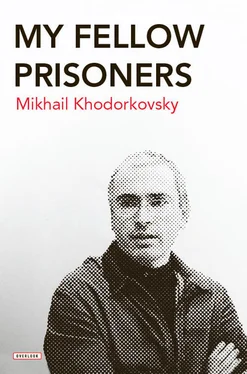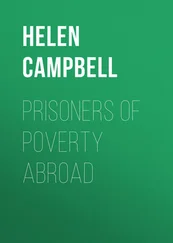However, it became clear that he totally lacked the will or readiness to fight for his own fate – so crucial if you’re to keep your head above water in today’s cruel world. His future was not hard to predict: prison – street – prison – death in a ditch from exposure or heart attack.
I have seen so many people like him over these years. And so often have I subsequently heard that they have died…
So then, what do you think? Is it not worth trying to make our world just a bit less cruel? After all, these people need only a very small bit of help…
Soon afterwards I was summoned to ‘have a chat’ with the prison governor and when I returned the cell was empty. They gave me fifteen minutes to get my things ready – I was being moved to a new prison.
I was leaving without saying goodbye, but having watched the latest REN-TV news – on a television that was now working pretty well.
In prison they’re also called ‘the dropouts’, the ‘downcast’ and a whole litany of other far less savoury names. They are the prison’s ‘caste of untouchables’: you don’t sit at the same table as them, eat from the same dish, use the same utensils, and so on. In any disagreement within the prison community, their voice carries no weight whatsoever; as such they’re unable to count on any form of protection.
Nowadays, thankfully, such distinctions are gradually eroding but much remains as it always was. Prison is a very conservative place.
In the world outside people generally think that it’s only homosexuals and those who have committed the most depraved crimes like rape or child abuse who find themselves in this position.
That hasn’t been the case for a long time. Nobody believes the courts any more, and anyone can claim that their sentence is just another result of coming into conflict with someone else’s commercial interest. It’s not easy to verify, and there are indeed a great number of cases relating to these ‘commercial’ issues.
There are not many genuine homosexuals in prison, so those who find themselves in the ‘aggrieved’ category are generally people who are unable to stand up for themselves, who have shown some form of weakness. And it is they who are forced to carry out all kinds of unpleasant work.
But sometimes it can turn out differently.
Ostap is one of the dozen or so ‘aggrieved’ who live in our barracks. A barracks is one large communal space – everything and everyone is on permanent view. Ostap didn’t seem particularly different. A small, quiet guy who, like the rest of his ‘caste’, did the cleaning, took out the rubbish and washed other people’s clothes. Nowadays, at least, this type of work is paid for in tea, cigarettes and the like.
Showing an interest in how someone came to be in this position is just not done.
Self-respecting detainees try to have a normal sort of relationship with the ‘aggrieved’, and avoid being discourteous, but those who feel that life has dealt them a raw deal and are more arrogant often look to bolster their own self-esteem by denigrating this defenceless group.
One day Ostap was just getting on with tidying up under a bed when a loutish bloke blatantly poked him below the waist as he went past, accompanying this distinctly offensive gesture with a no less offensive comment.
It was a run-of-the-mill occurrence, and usually the ‘aggrieved’ put up with it. And so Ostap, without standing up straight, muttered something quietly under his breath and moved slowly into the nearest corner.
Some halfwits standing a little way off started sniggering; to hear what Ostap was muttering you had to stand pretty close to him. He was repeating just one phrase: ‘I’ll kill you.’
When, half a minute later, Ostap finally stood up straight, in his hand was an enormous shank he’d pulled out from somewhere – a thirty-centimetre-long piece of file, sharpened to be as lethal as a dagger.
I literally leapt out of the way. I had no desire whatsoever to get a piece of forged steel like that in my side.
But Ostap was already heading towards his tormentor. The latter made a dash for the only door, but this was blocked by a surge of people racing for the exit – also keen to avoid getting caught up in the heat of the moment. The rest just stood there, petrified.
Ostap moved slowly but deliberately, and his opponent began to howl. That’s the only way to describe the drawn-out, bloodcurdling cry of a man who had just a few seconds left to live.
At this point we pulled ourselves together. Someone also screamed, someone, more cool-headed, moved the beds, preventing Ostap from reaching his target. His friends jumped in, grabbed him by the arms, dragged him off…
The reprieved victim eventually broke out of the barracks. He didn’t come back – ‘abandoning the detachment as a safety precaution’. A humiliating turn-of-phrase for the camp…
The following day Ostap was cleaning out the barracks once again, but people looked at him differently from then on. And when the regional prosecutor visited the camp for an inspection and invited anyone who wanted to meet him on a one-to-one basis (and this can be fraught with consequences), nobody was surprised when the only person who marched across the apparently deserted camp was Ostap.
‘ Our Ostap’, as he was now called in the detachment, with a note of pride.
Half the criminals freed on parole return to the familiar world of the labour camp.
Every morning in our barracks starts with the deafening sound of an alarm and a wild screech.
If you think that a yell of almost a hundred decibels can’t have any meaningful content, you’re sorely mistaken.
The person doing the yelling is Roma, the night-time orderly. His job is to get everyone up. And he does so with considerable inventive aplomb. The melody emitted under his direction from an ordinary bell, and the words that go with it, are different virtually every time. Sometimes the gags are so good you just can’t get up from laughing so hard.
Roma even looks like something from a gothic fable: sturdy, not very tall, with expressive, laughing eyes and a smile that reveals a single tooth in the middle of an otherwise empty mouth.
It was the booze that put Roma in jail. Whether it was just a fight or a robbery during a fight – he’s none too clear. ‘I don’t remember’ is all he can say.
Roma is making an effort to ‘get back on track’ and wants to apply for parole. Working as an orderly should help.
Occasionally I tease him. ‘Why do you want to get out? It’s pretty good here – there’s food, protection, you’re kept off the booze…’
Roma is suddenly serious; he talks wistfully of how he’ll get out, fix his teeth, get a job at the local factory. He can rely on that…
The seriousness disappears as quickly as it came on, and he skips off to do a session on the horizontal bars, where he also performs wonders.
Then comes the court hearing. It’s a positive result. Ten days till freedom. Roma doesn’t know what to do with himself. From time to time he comes up to me and describes in detail, day by day, what he’ll do ‘beyond the fence’. I listen attentively. He obviously needs to get it out of his system, but I know the statistics only too well: 50 per cent come back for another ‘stay’.
Roma can sense my scepticism and tries passionately to convince me: ‘I’m not coming back here again, ever!’
I pull his leg: ‘Roma, at least try to get those teeth done.’ For which I’m subjected to another detailed repetition of his plans.
Release day. Roma’s somehow found himself a tracksuit and trainers, and he walks along the detachment yard followed by good wishes and goodbyes.
Читать дальше












